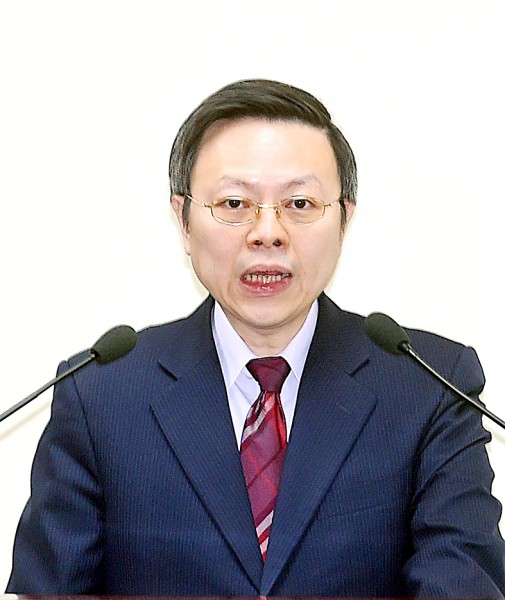《TAIPEI TIMES 焦點》 Hard line from China expected post elections

Mainland Affairs Council Minister Wang Yu-chi yesterday said that the council expected China to toughen its stance on adherence to the “1992 consensus” on the “one China” principle as a precondition for cross-strait exchanges. Photo: Taipei Times
‘CONSENSUS’: Mainland Affairs Council Minister Wang Yu-chi offered an analysis of China’s possible reactions to the nine-in-one elections last month
By Shih Hsiu-chuan / Staff reporter
Mainland Affairs Council Minister Wang Yu-chi (王郁琦) yesterday said that the council expected China to toughen its stance on adherence to the “1992 consensus” on the “one China” principle as a precondition for cross-strait exchanges and against Taiwan’s independence in the wake of the nine-in-one elections on Nov. 29.
The “1992 consensus,” a term that former Mainland Affairs Council chairman Su Chi (蘇起) admitted to making up in 2000, refers to a purported agreement reached by Taipei and Beijing that there is “one China, with each side having its own interpretation.”
Wang delivered an analysis on how the election — which saw the Chinese Nationalist Party (KMT) suffer massive losses — would affect cross-strait relations when he was invited by the KMT to participate in its weekly Central Standing Committee meeting yesterday.
After the election, China is likely stick to its current policy line on pushing for peaceful development of cross-strait relations, but Beijing would also likely review its on-the-ground approaches and enforce its effort to consolidate the consensus and to repress forces seeking Taiwan’s independence, Wang said.
Wang added that China would bolster efforts to reach out to the nation’s younger generations and grassroots-level groups in Taiwan, because younger people have demonstrated their powerful political influence in the elections.
For its part, the council has been steering cross-strait relations in the right direction over recent years, Wang said, adding that it would find more effective ways to communicate with the younger generations, Internet users and people from all walks of life on cross-strait issues and take their views into consideration.
Wang said that academics in Hong Kong and Macau have predicted more difficulties in cross-strait negotiations on a trade in goods pact and the establishment of representative offices on both sides of the Taiwan Strait for the rest of President Ma Ying-jeou’s (馬英九) term, saying that the chances of the Democratic Progressive Party (DPP) changing its attitudes on such issues would be slim.
After listening to the analysis, Vice President and KMT acting chairman Wu Den-yih (吳敦義) said the post-election situation has evolved in a way that would affect the government’s approach to cross-strait issues, even though the election results were not a barometer of the public’s view of cross-strait policies.
Wu emphasized the importance adhering to the principle of the “1992 consensus” to continue developing cross-strait ties, but added that the executive branch should make its policymaking process more transparent and accessible, enabling the public to voice its views.
Earlier yesterday, when asked to comment on independent Taipei mayor-elect Ko Wen-je’s (柯文哲) desire to continue intercity exchanges between Taipei and Shanghai, China’s Taiwan Affairs Office spokesperson Fan Liqing (范麗青) said that the consensus was a prerequisite for cross-strait engagement.
At a regular news conference, Fan was also asked to comment on a statement recently made by DPP Secretary-General Joseph Wu (吳釗燮) during a trip to Washington.
Wu said that the party would be open to discussions with China over the so-called “1992 consensus,” but was opposed to the position held by Beijing that the consensus was a prerequisite for talks.
“Our policy toward the DPP has been clear and consistent. The position we have held against [the forces] seeking Taiwan’s independence to separate [Taiwan from China] is unshakeable,” Fan said.
新聞來源:TAIPEI TIMES











